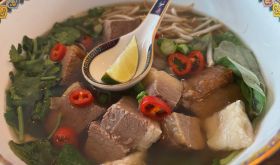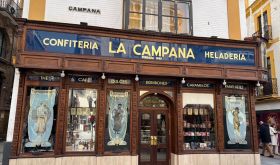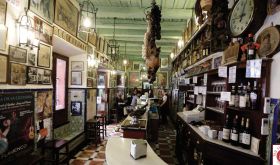The Greek financial crisis has at least reminded me of one of the country's growing assets: the modern, vibrant, fresh and healthy Greek food I have enjoyed in Athens, on the island of Santorini, and in London between 1999 and 2006 when Theodore Kyriakou was at the helm of The Real Greek restaurant.
We set off, in the hope of something equally exciting, to Elysée, the recently refurbished Greek restaurant just off Tottenham Court Road in central London – and our initial reaction was one of pleasure mixed with surprise.
At the back of this three-storey townhouse there is, most unusually for London, a roof terrace with a retractable, protective cover rather like the one at Wimbledon, which, sadly, we saw whirr into action to ward off a few rain drops within 15 minutes of sitting down. Until then we had enjoyed an uninterrupted view of the sky, albeit from a table littered with ashtrays, as this terrace is also a haven for smokers.
After dinner we were accompanied on our way out, down the narrow staircase that links the restaurant's numerous rooms, by the manager in his smart suit. He explained that the restaurant was quieter at the beginning of the week now that so many Greek students in London had returned home as their exams were over. But he encouraged us to return later in the week when the place was much busier. He promised us someone playing the bazooka and lots of smashed plates. We grimaced.
The meal itself had been something of a rollercoaster, too. Our waiter could not have been more enthusiastic, responding to our request for a bottle of the delicious Gerovassiliou Malagousia 2010, produced south east of Thessaloniki, with a huge smile and adding, 'I am Greek and you make me very happy ordering that.'
With this he suggested some mezze and the meal turned very ordinary. Along came some palatable houmous, taramasalata, stuffed vine leaves, grilled haloumi and spinach in filo pastry triangles along with some spicy, grilled Greek sausages and octopus and one of the limpest renditions of deep fried calamari I have ever encountered. The Greek desserts were ridiculously sweet, and the kitchen didn't seem at all interested in creating anything more original than these, which they may well have bought in.
Part of our disappointment was related to the fact that we were having dinner with Steve Daniel, with whom we had last dined in 2003, on a trip to the volcanic Greek island of Santorini, where he has had a home for over a decade. There he had introduced us to particularly exciting Greek food, most memorably at Tomato right by the seashore, once a tomato processing plant then a restaurant and today, I learnt, a winery.
Santorini's restaurants have become even better since then, he told me, as have its wines, and Daniel was off there in a few days with the sommelier from Zuma, London's most successful Japanese restaurant alongside Nobu, to which Daniel's company Novum also supplies new-wave Greek wines.
Daniel's current favourite Santorini restaurants are Selene, Saltsa and Camille Stefani in Fira and 1800 in Oia. As an importer of Greek wines into the UK, Daniel is already aware that he will be in competition with buyers from restaurants across the US on whom Greek wine merchants are now focusing their attention after their domestic market has slumped in line with their economy. His face clouded over only when he added that it is much more difficult to sell top Greek wines to Greek restaurateurs in the UK. 'They simply won't pay the price, although they are really not that expensive', he sighed.
To discover why no one is executing modern, Greek food in London today I finally tracked down Kyriakou as he was about to board a gulet in Bodrum, Turkey, to run a Greek cookery class around the island of Rhodes. He was clear as to why London's Greek restaurants seem to be stuck in the doldrums.
'I think that although The Real Greek really did change many peoples' impressions of what the best Greek food is today, the problem was that I was operating on my own. There was no competition, no alternatives for my customers to try, and therefore never enough momentum to educate and to change public perception. Too many people still think Greek restaurants have to be cheap and cheerful. I look at what is happening with Scandinavian food now and I am very jealous. Its reputation is getting bigger and bigger because there are so many more new and different chefs for curious customers to enjoy and for journalists to write about.'
I put it to Kyriakou that perhaps it was the labour-intensive nature of the moreish Greek meze that has held back its renaissance but he disagreed. 'I don't think it's more so than classic French, for example, and south of Rome food generally gets more straightforward. Greek food is honest, relies on good ingredients and strong flavours. Only the slow-cooked dishes take a lot of time, but that is cooking time when they have already been prepared and put in the oven.'
Kyriakou ended with some guarded but good news for lovers of fine Greek food in London. When he sold in 2006 it was with a restriction that he could not practise in this field but this limitation has now expired. Encouraged by the success of Spuntino in Soho and The Opera Tavern in Covent Garden, which are, he believes, similar in their approach to the mezodopolio, or wine bar, he opened next to The Real Greek, Kyriakou is planning a return to the stoves. 'There is something on the drawing board and by October I will be able to tell you much more', he added, down what had now become a very crackly line.
I do hope many other Greek chefs decide to follow in his wake.
www.elyseerestaurant.com













